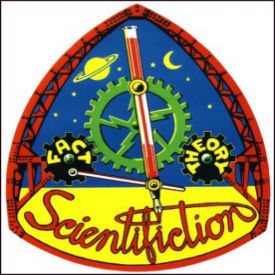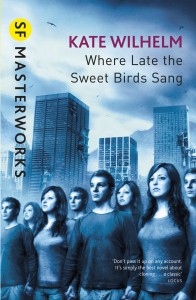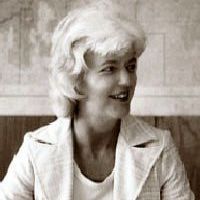 This week we continue to add to our list of the Greatest Science Fiction Novels of All Time. We continue the effort to select novels for the list based on evidence and objective data rather than personal opinion.
This week we continue to add to our list of the Greatest Science Fiction Novels of All Time. We continue the effort to select novels for the list based on evidence and objective data rather than personal opinion.
The evidence for a novel’s greatness can first be witnessed in the many awards it has received. In the current century there are many awards that are given to great works of science fiction, but in the early days of the genre there were very few. If we go back far enough, there were none at all, eliminating this metric for the earlier works of science fiction.
In addition to the awards, we examine the commercial success of the novel. This objective measuring stick gauges the opinion of the masses. Do fans of science fiction think enough of the book to keep on reading it and tell their friends to read it?
Science fiction also has the ability to inspire people to great things. The impact of science fiction on society cannot be easily quantifiable. SFWA Grand Master James Gunn always talks about saving the world through science fiction. The evidence is out there that science fiction has helped inspire and build the world we live in today. Our list will pay homage to those novels that helped shape the world and inspire scientists to create fantastic new technology while allowing society to see the world through a new perspective.
Before we move onto this week’s entry, we will take a look back at the novels on the list so far. The entries on our list appear in no particular order.
The Greatest Science Fiction Novels of All Time
- Rendezvous on Rama by Arthur C. Clarke (Best Novel Awards: Hugo 1974, Nebula 1973, Locus 1974, Campbell 1974, British Science Fiction Association 1973, Jupiter 1974, Seiun 1980)
- Gateway by Frederik Pohl (Best Novel Awards: Hugo 1978, Nebula 1977, Locus 1978, Campbell 1978)
- The Dispossessed by Ursula K. Le Guin (Best Novel Awards: Hugo 1975, Nebula 1975, Locus 1975, Jupiter 1975; Nominations: Campbell 1975)
- Dune by Frank Herbert (Best Novel Awards: Hugo 1966, Nebula 1966; Nominations: Hugo 1964 for Dune World)
- Neuromancer by William Gibson (Best Novel Awards: Hugo 1985, Nebula 1985, Philip K. Dick 1984; Nominations: Campbell 1985, British Science Fiction 1984)
- Startide Rising by David Brin (Best Novel Awards: Hugo 1984, Nebula 1984, Locus 1984)
- Ancillary Justice by Ann Leckie (Best Novel Awards: Hugo 2014, Nebula 2014, British Science Fiction 2013, Arthur C. Clarke 2014; Best First Novel Awards: Locus 2014, Kitschies Golden Tentacle 2013; Nominations: Philip K. Dick 2013, James Tiptree, Jr. 2013, Compton Crook 2014, Campbell 2014)
- The Forever War by Joe Haldeman (Best Novel Awards: Hugo 1976, Nebula 1975, Locus 1976)
- Frankenstein; or, The Modern Prometheus by Mary Shelley
- Twenty Thousand Leagues Under the Sea by Jules Verne
- The Left Hand of Darkness by Ursula K. Le Guin (Best Novel Awards: Hugo 1970, Nebula 1970, James Tiptree, Jr. Retrospective Award)
Where Late the Sweet Birds Sang by Kate Wilhelm
Title: Where Late the Sweet Birds Sang
Author: Kate Wilhelm
First Year Published: 1976
Awards:
- Locus Award for Best Novel 1977
- Hugo Award for Best Novel 1977
- Jupiter Award for Best Novel 1977
Nominations:
- Nebula Award for Best Novel 1976
- John W. Campbell Memorial Award 1977
Where Late the Sweet Birds Sang is one of the greatest science fiction novels of all time. Kate Wilhelm is one of the cornerstones of the science fiction industry, and many consider this her best work.
Like many of the great authors her writing slips between genres. In Where Late the Sweet Birds Sang, Kate leaves no doubt the novel is science fiction. In the novel, she blends a deep exploration of humanity with scientific discovery.
Kate speculates on the individual identity of humanity and what happens when it gets blended into the collective. Her characters fight against themselves, the harsh world, and those who have differing views.
The novel was well received during its debut winning the Hugo, Locus, and Jupiter awards. The year 1977 was filled with amazing science fiction, offering Kate’s novel stiff competition. She was also nominated for the Campbell and Nebula awards.

In my recent interview with Kate, she discussed the origins of her masterpiece.
“At the time I was thinking about and then writing Where Late the Sweet Birds Sang I was reading about children passing through Israeli kibbutzim. One study stated that the kids were exceptionally honest, dutiful, well mannered, obedient, all good qualities. But they were not very creative. I was also reading the Watson/Crick book on the double helix, and the implications their discovery posited, one of which was the possibility of cloning. There were articles about the growing global economies, the possibility of a global pandemic from a newly emerged disease as yet unknown, and a possible global shift in climate. The globalization of diverse societies was starting to get attention. All of those disparate articles and books played a part in my thinking through the novel. Add people to the mix and you have the story. Until you have the people, the characters, it all remains a set of interesting data, nothing more.”
If you have not already read Where Late the Sweet Birds Sang, I would recommend you move it to the top of your list. In the novel, Kate Wilhelm will challenge and entertain you. It is truly one of the greatest science fiction novels of all time.










